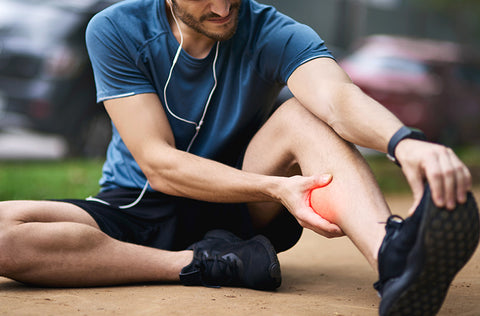How to relieve sore muscles and muscle pain after exercise?
Regular exercising is an important component of a healthy and active lifestyle. However, working out your muscles can cause some amount of muscle soreness and pain. This is especially true if you try a new exercise or level up the intensity of your workout.
Post-workout muscle soreness is a common muscle reaction to training. It can feel really validating as it is a sign that your muscles are trying to respond to the change in movement, grow and get stronger. You may get sore right away, also called acute soreness. Or you may feel the soreness and discomfort peak about 12 to 72 hours post-workout, known as delayed onset muscle soreness (DOMS).
The good news is that there are a few steps that you can take to relieve the muscle pain and soreness and work your way through it.
Let’s find out!
-
Warming up before workouts: Always warm up your body before a workout to increase the blood flow to the muscles and wake them up. You can start with some walking and slowly pick up the pace or begin with some simple movements like arm swings and high knees, depending upon the muscle group you are going to work out. This will not just reduce the chances of injury during the workout but will also help reduce the incidence of post-workout muscle soreness.
-
Get stretching: Stretching your muscles after a rigorous workout can go a long way towards preventing or reducing post-workout soreness. It can help release the tightness in the muscle and increase the range of motion when sore, making you feel better.

-
Stay hydrated: Staying hydrated is a crucial part of muscle recovery. It helps in easing inflammation, flushing out waste products, and delivering nutrients to the muscles. As dehydration is known to increase muscle soreness, increased levels of hydration can help in minimizing it.
-
Use an ice pack: Sometimes extreme soreness may come with some swelling. Using an ice pack can help in reducing the swelling and relieving some pain-causing tension in the muscles.

-
Get a massage: Gently massaging tender points can help in easing the muscle soreness and pain. It will help to relax the very tight sore muscles and soothe the muscle aches. You can also use recovery tools such as foam rollers or a massage gun to do this. However, do it carefully, and make sure you do not go overboard and cause more muscle damage.
-
Do light exercises: Muscle soreness and pain is an indicator that your muscles have been stretched and are slowly getting stronger. Hence, you mustn't stop working out. Doing light activities and exercises will increase circulation and improve blood flow throughout the body and speed up the repair process.

-
Get adequate rest: Sleep is one of the most important and underrated aspects of improved athletic performance. Make sure you get enough sleep after a tough workout to provide the muscles with the time they need to efficiently recover, repair, and get stronger.
It is important to understand that if the slightly annoying ache does not disappear within a few days and is becoming borderline painful or even incapacitating, it’s your body’s way of telling you to slow down or may even be indicative of an injury. A good idea to avoid injuries and make the most of your workouts is to work out under the guidance of a trainer.
Looking to level up your fitness game? Check out our MSF Transformation Plans and receive a customized workout and diet plan that is tailor-made to your current fitness level, unique lifestyle, budget, dietary preferences, and comes with adequate guidance.
References:
- https://www.medicalnewstoday.com/articles/327138#causes
- https://www.self.com/story/how-deal-post-workout-muscle-soreness-really-painful
- https://www.nhs.uk/live-well/exercise/pain-after-exercise/
- https://www.everydayhealth.com/fitness/quick-fixes-for-sore-muscles.aspx
- https://www.healthxchange.sg/fitness-exercise/sports-injuries/how-relieve-sore-muscles-pain
- https://familydoctor.org/sore-muscles/
- https://www.webmd.com/fitness-exercise/features/sore-muscles-after-workout
